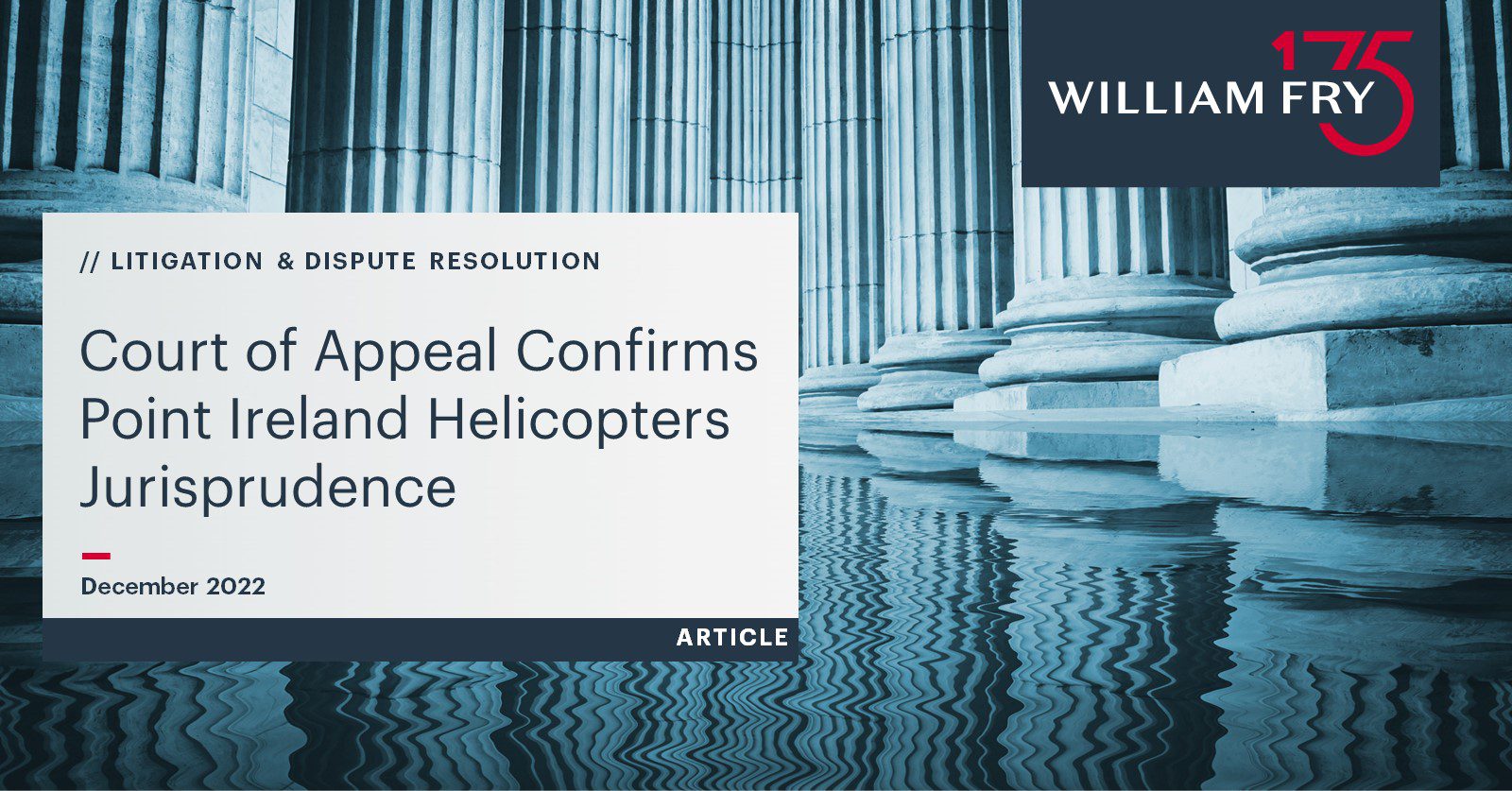Abbey International Finance Limited v Point Ireland Helicopters Limited [2012] 2 I.R. 694 (Point Ireland Helicopters) established that the High Court has an inherent jurisdiction to grant summary judgment in plenary proceedings, where it was satisfied that the defendant had failed to identify an arguable defence, and it was clear that the defendant had no defence.
The Court of Appeal, in its recent judgment in Inland Fisheries Ireland v Ó Baoill & ors [2022] IECA 266 (Inland Fisheries Ireland), confirmed the Point Ireland Helicopters jurisprudence in this regard.
The proceedings in Inland Fisheries Ireland concerned fishing rights on the Geebarra River in Donegal. The High Court, in 2019, had granted relief to the plaintiff-respondent on foot of an application for summary judgment. The defendants-appellants appealed to the Court of Appeal (COA).
The COA noted that the conclusions reached in Point Ireland Helicopters were based on the court’s inherent jurisdiction and the specific court rules applicable to cases in the Commercial List of the High Court. However, the COA was satisfied that the High Court’s inherent jurisdiction applied equally to cases outside the Commercial Court. Giving judgment for the COA, Ms Justice Whelan noted that a conservative approach must be adopted by a court when considering whether to dispose of a plenary suit summarily as set out in Harrisrange Limited v Duncan [2003] 4 I.R. 1 (Harrisrange). Whelan J considered the below twelve Harrisrange factors of assistance in such an analysis;
- The power to grant summary judgment should be exercised with discernible caution.
- The court should look at the entirety of the situation and consider the particular facts of each individual case.
- In so doing, the court should assess not only the defendant’s response, but also in the context of that response, the cogency of the evidence adduced on behalf of the plaintiff, being mindful at all times of the unavoidable limitations which are inherent in any conflicting Affidavit evidence.
- Where there are issues of simplicity or issues easily determinable, then this procedure is suitable for use.
- Where there are issues of fact which in themselves are material to success or failure, then their resolution is unsuitable for this procedure.
- Where there are issues of law, the summary process may be appropriate but only if it is clear that fuller argument and greater thought is evidently not required for a better determination of such issues.
- The test to be applied is whether the defendant has satisfied the court that he has a fair or reasonable probability of having a real or bona fide defence.
- This test is not the same and should not be elevated into a threshold of a defendant having to prove that his defence will probably succeed or that success is not improbable; it is sufficient if there is an arguable defence.
- Leave to defend should be granted unless it is very clear that there is no defence.
- Leave to defend should not be refused only because the court has reason to doubt the bona fides of the defendant or has reason to doubt whether he has a genuine cause of action.
- Leave should not be granted where the only relevant averment in the totality of the evidence, is a mere assertion of a given situation which forms the basis of a defence; and
- The overriding determining factor is the achievement of a just result, whether that is through liberty to enter judgment or leave to defend.
William Fry recently advised the plaintiff in the case of Pola Logistics Limited v GTLK Europe DAC and GTLK Malta Four Limited and Central Bank of Ireland [2022] IEHC 501 (Pola Logistics) where Mr Justice Sanfey reiterated his findings from an earlier decision in McAteer v Fried [2021] IEHC 249, that the High Court has an inherent jurisdiction to grant summary judgment in plenary actions, outside proceedings in the Commercial Court. Sanfey J was satisfied that the invocation of such relief may be particularly appropriate in circumstances where there is either clearly no defence, or where the defendant effectively acquiesces in the relief sought. Sanfey J, however cautioned in Pola Logistics that the danger in granting summary relief on foot of a motion is that the issues of contention between the parties are not properly explored or ventilated.
The Court of Appeal in Inland Fisheries Ireland is significant as it develops this line of authority, where the application for summary disposal of the plenary proceedings was opposed by the defendant.
Conclusion
Inland Fisheries Ireland is authority for the proposition that, where the balance of justice so requires plenary proceedings may be decided summarily. Where a purported defence discloses no reasonable answer to the plaintiff’s claim, the court has an inherent jurisdiction to grant summary judgment where same is warranted. The court can do so having duly considered all material facts for the appropriate management of the litigation. This judgment is a welcome confirmation of the possibility of obtaining summary judgment in plenary proceedings. It puts the inherent jurisdiction of courts, derived from jurisprudence in commercial proceedings, on a stable footing and arguably broadens the scope of that jurisprudence.
Contributed by Mollie Lenihan McGrane & Sonja Heppner



